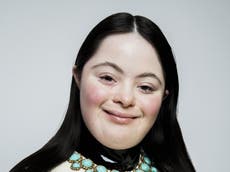Emmerdale’s Down’s abortion plot shows disability education is severely lacking in Britain
The recent controversial storyline on ITV’s soap demonstrates just how little support some families receive during their pregnancy


Your support helps us to tell the story
From reproductive rights to climate change to Big Tech, The Independent is on the ground when the story is developing. Whether it's investigating the financials of Elon Musk's pro-Trump PAC or producing our latest documentary, 'The A Word', which shines a light on the American women fighting for reproductive rights, we know how important it is to parse out the facts from the messaging.
At such a critical moment in US history, we need reporters on the ground. Your donation allows us to keep sending journalists to speak to both sides of the story.
The Independent is trusted by Americans across the entire political spectrum. And unlike many other quality news outlets, we choose not to lock Americans out of our reporting and analysis with paywalls. We believe quality journalism should be available to everyone, paid for by those who can afford it.
Your support makes all the difference.Thirty-three years ago, I gave birth to a baby boy with what was described then as a “development delay”. For the first five years of his life as new parents, we muddled through.
We had no diagnosis until my son was five years old and that came in the form of a letter that arrived on a Saturday morning in the post from the local hospital genetics clinic.
We were in shock. We lacked any information and desperately needed somebody to talk to. Thank goodness for the Fragile X Society where another parent took my call that Saturday morning. For many years we accidently stumbled across information, usually from another parent of a child with a learning disability who in passing mentioned “benefits” or “respite”. We began to appreciate that there was support for families like ours.
Although the provision of services and support for families of disabled children has improved since the 80s, people with a learning disability still face discrimination at every point in their life. Severe inequalities in access to healthcare is just one example and it often starts in childhood – sometimes before the child is even born.
We are seeing an example of this play out on primetime TV at the moment. This week, ITV’s Emmerdale has been telling the story of a couple who, following an NHS antenatal screening, are given a prenatal diagnosis of Down’s syndrome. Without the right level of support, parents-to-be are left to process a huge amount of information at a very emotional time in their relationship.
Ultimately the characters in the soap opera decide to have a termination, a plot twist which has caused serious distress amongst people with Down’s syndrome, their families and the wider learning disability community. The way in which the story has played out has attracted huge media attention and widespread criticism from families.
Storylines like this risk entrenching outdated and negative views about the lives of people with a learning disability.
This storyline shines a light on what disability charities, such as Mencap, already know – that institutional discrimination exists resulting in many people with a learning disability dying decades younger than the general population, and constantly facing systematic barriers in achieving their aspirations. Barriers arise in education, accessing employment and getting the right support to live their lives as they choose. This storyline has demonstrated just how little support some families receive at this critical time and, sadly, we know this is far too common.
The recent Mencap Early Years Survey – which gathered responses from 116 families of children with a learning disability aged between 0-5 years – found that only 31 per cent of parents or carers said they received the right type and amount of information from the hospital care team in the weeks and months following their child being diagnosed as having a learning disability.
Many said their experience of diagnosis was negative, confusing and traumatic. It is of deep concern that nearly half (45 per cent) reported they had experienced negativity, prejudice or discrimination from healthcare professionals.
Following a pre-natal diagnosis, families told us about the negative language used and the worst-case scenarios that were presented to them about their child’s future, with doctors being dismissive about their child’s potential and offers of terminations instead of support and guidance being commonplace.
All too often this stigma, discrimination and inequality in healthcare starts at the point of diagnosis, and lasts throughout childhood and beyond, often leading to inequalities that last a lifetime for people with a learning disability and their families. Urgent changes to the information, advice and support that is available to families, are needed.
To tackle this, and as part of Mencap’s long-running Treat Me Well campaign – which aims to ensure hospital treatment for people with a learning disability is the best it can be – Mencap is launching a new Children’s Campaign, which demands changes in our healthcare system to create better health outcomes for children with a learning disability.
One key part of this campaign is the call for a “disability co-ordinator” within hospitals to provide a vital link between the hospital and the community. This role will support and signpost families of children with a learning disability, from the point of diagnosis to ensure they get the medical and social support they need. Whether it's before or after birth, or later in life, hospital staff are key in identifying support needs.
Families should not be left to navigate a complex maze of services on their own especially at a time when they need support the most.
Having the right kind of access to the specialist support and health information and it being communicated in an appropriate way is fundamental to ensure the best outcomes for the whole family. The health and wellbeing of people with a learning disability – and closing the inequality gaps – starts in childhood, often at the point of diagnosis. Those first interactions with medical staff can help to pave the way for better care throughout a child’s life; a positive outlook, clear communication and adequate, compassionate support can make a big difference – today and in the future.
The first doctor I spoke to, upon my son’s diagnosis, said to me … “he won’t ever tie his shoelaces or ride a bike and will require institutional living when he’s older”. Other than the shoelaces (thank goodness for Velcro!) my son is living a fulfilled and valued life.
People with a learning disability have so much to offer the world and outdated and negative views have no place in society today.
I am pleased to say that the initial responses from the NHS Trusts we have contacted are all very positive. However, we will not rest until families report an improvement in the advice, information and support they are given – and until people with a learning disability have equality in accessing healthcare.
Edel Harris is CEO of Mencap. To find out more about Mencap’s Children’s Campaign and for resources for parents and healthcare professionals visit: www.mencap.org.uk/get-involved/campaign-mencap/treat-me-well/treat-me-well-children.




Join our commenting forum
Join thought-provoking conversations, follow other Independent readers and see their replies
Comments